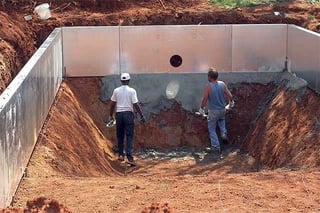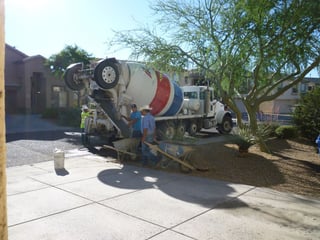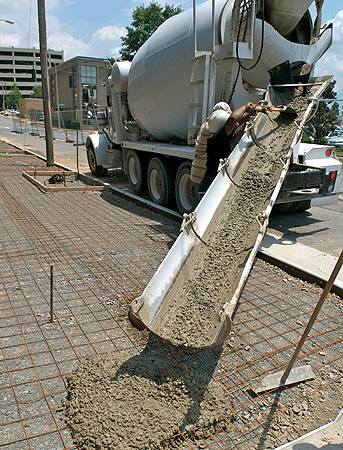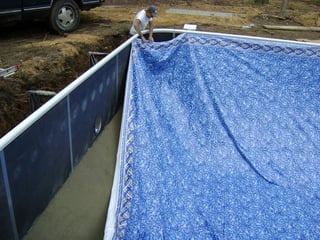
Planning a new vinyl liner pool and unsure what to do with the floor? Although River Pools now specializes in fiberglass pools, we started out working only with vinyl liner pools, and we want to share our knowledge so you can make the best decision for you and your family.
The two most common materials for the bottom of your pool are vermiculite and grout. Whichever material you choose, you’ll apply it right on top of the soil with a round-edged pool trowel, and then the liner goes on top of it. So what’s the difference between vermiculite and grout for your vinyl liner pool base? And which is better?
What is vermiculite?
Actual vermiculite is a mineral (often in the form of clay) that expands when heated. What pool people refer to as “vermiculite” is a mixture of the mineral/clay vermiculite and Portland cement. You buy this mixture in bags as a pool base.
You bring a pallet of sacks to the pool site, mix it with water, load it up in buckets, and dump it down into the pool. That sounds cathartic, if you ask me.
Pros
Vermiculite works well with wet, expansive soil or areas with a high water table.
Vermiculite is softer than grout. Even when it sets, it doesn’t get hard like concrete (or even just grout). If it’s done right, you can walk on it without leaving any heel prints.
Because it’s soft, it’s a little more forgiving if you get something under the liner. For example, you could push a small pebble down into the vermiculite if you had to, although you do run the risk of the rock tearing your liner. (In the case of a bigger rock, you’re better off removing the liner, removing the problem, and replacing the liner.) But the point here is that you could never do that with a grout pool base.
On the job site, you can mix the vermiculite yourself and apply it at your own pace. You aren’t under a time crunch the way you would be with grout. You can mix a bag here and there to go as fast or slow as you want.

Cons
Vermiculite is harder to apply and level. It isn’t as creamy as grout. If you’re high in one place and low in another, you can’t just smooth it out; you have to kind of chop it down.
It’s also harder to get clean, crisp lines with vermiculite. Think about the distinct edges where the pool bottom meets the walls, or where the shallow end angles down to become the deep end. The pool bottom is contoured, not amorphous and blobby. Because vermiculite is lumpy, it’s hard to get it into the exact angles you want.
Vermiculite, especially in pre-mixed bags, tends to cost the same or a little more than grout.
What is grout?
Grout is a form of concrete made of sand, cement, and water.
It’s usually brought to the pool site in a ready-mix concrete truck.

The grout pours out a chute into your pool-shaped hole in the ground.

Pros
It provides more compressible strength than vermiculite (2000 psi or more compared to 100 psi).
Grout is creamier than vermiculite. It’s easier to finish because you can smooth it all out in one stroke.
It sets up harder, so you don’t have to worry about footprints or heel prints.
Grout is faster and easier for the builder because it comes premixed in a truck. You don’t have to mix it yourself; you basically just dump it in the hole and finish it.
Because grout is smooth and easy to manipulate, you can form clean, crisp lines around the edges of the pool.
Grout is also more resistant to roots and to shifting and settling over time. If you replace a liner in a pool with a grout bottom, you usually don’t have to do much to it at all. With a vermiculite bottom, you almost always have to go in and do some touchups.

Cons
With grout, you have less freedom to work at your own pace. When the concrete truck shows up, you have to get the grout off the truck and into place before it sets up and cures (hardens). If you tend to move slowly like me, you may want to recruit a faster-paced friend to keep you on track.
Which pool base should I choose?
We recommend you use grout for the bottom of your vinyl liner pool. Based on our experience, grout makes for a better finish and is more durable.
Alternatives to vinyl liner pools
If you’re looking for a low-maintenance pool with a fast, easy installation, you may want to look into fiberglass pools.
Our co-owner, Jason, started installing vinyl liner pools when he was 16. It was all he did through high school and college, and it was all we did when we first started River Pools. We did vinyl liner pools exclusively until we discovered fiberglass pools 15 years ago. We fell in love with them and decided we wanted to make them our Special Thing. We haven’t looked back since then, and our customers are happy.
Fiberglass pools are extremely durable. You don’t have to worry about liner replacements or punctures. If you’d like to learn more, check out our comparison of fiberglass, vinyl liner, and concrete pools. You can also download our ebook for an even more in-depth comparison.









